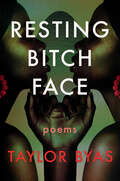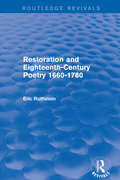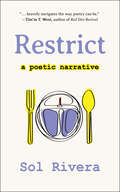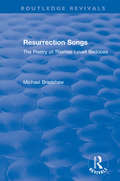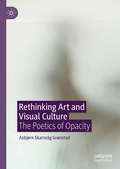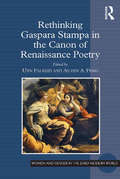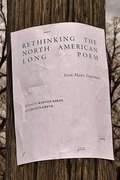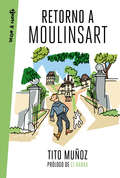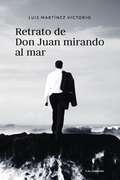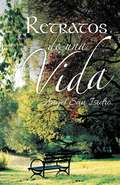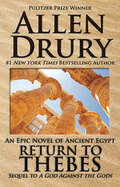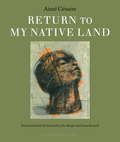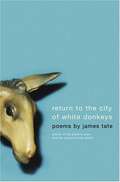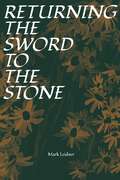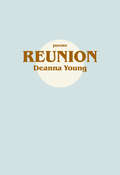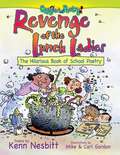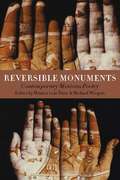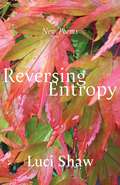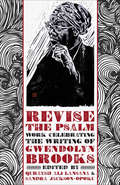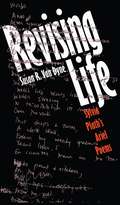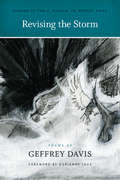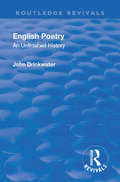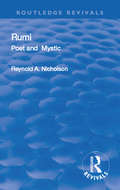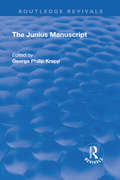- Table View
- List View
Resting Bitch Face: Poems
by Taylor ByasAn Audacious Book Club Pick The author of the award-winning national bestseller I Done Clicked My Heels Three Times returns with a poetry collection that transforms the Black female speaker from object, artistic muse, and victim to subject, critic, and master of her storyResting Bitch Face is a book for women, for Black women, for lovers of art and film criticism, and for writers interested in work that finds a middle ground between poetry and prose. Taylor Byas uses some of our most common ways of &“watching&” throughout history (painting, films, sculpture, and photographs) to explore how these mediums shape Black female subjectivity.From the examination of artwork by Picasso, Gauguin, Sally Mann, and Nan Goldin, Byas displays her mastery of the poetic form by engaging in intimate and inventive writing. Fluctuating between watcher and watched, the speaker of these poems uses mirrors and reflections to flip the script and talk back to histories of art, text, photography, relationships, and men. From Polaroids to gesso primer to sculpture, Byas creates a world in which the artist calls out and the muse responds. For not only does she enter the world of the long-revered classic artist, but she also infuses her poems with such iconic pop culture works as The Joker, WandaVision, and Last Tango in Paris.
Restoration and Eighteenth-Century Poetry 1660-1780 (Routledge Revivals)
by Eric RothsteinRestoration and Eighteenth-Century Poetry 1660-1780, originally published in 1981, considers poetry written between 1660 and 1780, a period which, although largely recovered from its nineteenth-century reputation, still attracts widely varying critical responses. Abandoning the old labels such as ‘neoclassicism’, ‘romanticism’ and ‘sensibility’, the author focuses on descriptions of genres and their formal elements and traces the broader patterns of literary and historical change running through the period. Eric Rothstein describes different poetic modes- panegyric, satire, pastoral and topographical poetry, the epistle, and the ode- to suggest their aesthetical possibilities as well as their process of change. He also considers style and the uses of the past, topics which have often caused particular problems for the students of the period. What becomes clear is the extraordinary originality, flexibility and power with which Restoration and eighteenth-century poets handles the stylistic assumptions and the body of poems they inherited and employed in their own works.
Restrict: A Poetic Narrative
by Sol RiveraA powerful work of poetic narrative fiction, Restrict is the raw yet resonant story of a teenage girl's coming of age in a world that cares more about her weight than her mental health.Told from the perspective of a young woman who has abandoned her own name to distance herself from the emotional trauma of growing up, Little Girl&’s story is a modern examination of eating disorders, body image, puberty, and self-worth. And as the pressure to diet starts to become too much, the question faced by Little Girl is this: how can she ever experience self-love in a world focused solely on her appearance?Created by teenage author Sol Rivera, Restrict is her powerful and cathartic tale of a struggle shared amongst teenagers. This poetry collection serves as a light on the journey of self-discovery… something which too many have been denied.
Resurrection Songs: The Poetry of Thomas Lovell Beddoes (Routledge Revivals)
by Michael BradshawThis title was first published in 2001. Thomas Lovell Beddoes (1803-49) was a powerful poet of the English Romantic period, who has been and is still strangely neglected by critics. His macabre blank verse dramatic writings and his delicately balanced lyrics have both won ardent admirers such as Browning, Gosse, Pound and Christopher Ricks. Yet there are formal and generic problems in Beddoes's writings which continue to marginalize him as merely an eccentric, and the canon of Romanticism seems to have found no place for him.
Rethinking Art and Visual Culture: The Poetics of Opacity
by Asbjørn Skarsvåg GrønstadThis is the first book to offer a systematic account of the concept of opacity in the aesthetic field. Engaging with works by Ernie Gehr, John Akomfrah, Matt Saunders, David Lynch, Trevor Paglen, Zach Blas, and Low, the study considers the cultural, epistemological, and ethical values of images and sounds that are fuzzy, indeterminate, distorted, degraded, or otherwise indistinct. Rethinking Art and Visual Culture shows how opaque forms of art address problems of mediation, knowledge, and information. It also intervenes in current debates about new systems of visibility and surveillance by explaining how indefinite art provides a critique of the positivist drive behind these regimes. A timely contribution to media theory, cinema studies, American studies, and aesthetics, the book presents a novel and extensive analysis of the politics of transparency.
Rethinking Gaspara Stampa in the Canon of Renaissance Poetry (Women and Gender in the Early Modern World)
by Unn Falkeid Aileen FengDespite the fact that Gaspara Stampa (1523?-1554) has been recognized as one of the greatest and most creative poets and musicians of the Italian Renaissance, scholarship on her work has been surprisingly scarce and uncoordinated. In recent years, critical attention towards her work has increased, but until now there have been no anthologies dedicated solely to Stampa. Rethinking Gaspara Stampa in the Canon of Renaissance Poetry aims to set a foundation for further Stampa studies by accounting for her contributions to literature, music history, gender studies, the history of ideas, philosophy, and other areas of critical thought. This volume brings together an international group of interdisciplinary scholars who employ varied methodologies to explore multiple aspects of Stampa’s work in dialogue with the most recent scholarship in the field. The chapters emphasize the many ways in which Stampa’s poetry engages with multiple cultural movements of early modern Italy and Europe, including: Ficinian and Renaissance Neoplatonism, male-authored writing about women, Longinus’s theory of the sublime, the formation of writing communities, the rediscovery of Aristotle’s writings, and the reimagined relation between human and natural worlds. Taken as a whole, this volume presents a rich introduction to, and interdisciplinary investigation of, Gaspara Stampa’s impact on Renaissance culture.
Rethinking the North American Long Poem: Form, Matter, Experiment (Recencies Series: Research and Recovery in Twentieth-Century American Poetics)
by Ridvan Askin and Julius GreveFor centuries, critics, poets, poet-scholars, and philosophers have either openly proclaimed or tacitly assumed the long poem as the highest expression of literary ambition and excellence. Rethinking the North American Long Poem focuses on the North American variant of this notorious form—notorious because of its often forbidding and difficult character, particularly with respect to the dialectics of content and form, aesthetics and politics, matter and genre. In nine essays and a contextual introduction, the editors and contributors scrutinize seminal long poems by North American writers, including Walt Whitman’s “Song of Myself,” Ezra Pound’s The Cantos, Muriel Rukeyser’s The Book of the Dead, and Charles Olson’s The Maximus Poems. They also explore recent efforts that have redefined or reopened the case of the long poem, including Rachel Blau DuPlessis’s Drafts, M. NourbeSe Philip’s Zong!, and Claudia Rankine’s Citizen. Taking the categories of form, matter, and experiment as frames of conceptual reference, the book examines the ways in which material and immaterial aspects of literary practice and the philosophically and politically inscribed duality of experience and experiment are negotiated in and by North American long poems from the nineteenth century to the present.
Retorno a Moulinsart
by Tito MuñozTito Muñoz, un poeta excelente que además ha escrito canciones para artistas tan relevantes como Serrat o Ruibal, publica ahora en Verso&Cuento. Estas páginas son una invitación a pasear en pantalón corto o con el uniforme de las teresianas y una tirita en la rodilla por el paisaje de la infancia, los primeros besos y las fotografías de veranos antiguos, rumbo al sótano de Moulinsart, donde se conserva el tesoro de la memoria trazado en línea clara. Con una mirada cínica, callejera y sin concesiones, Tito Muñoz se recrea en la belleza de la invención con el firme propósito de, como recomendaba Ángel González, mantener sucia la estrofa y escupir dentro. Así que, ¡mil rayos, marinero de agua dulce, bachi-bazuk de los Cárpatos!, abre el libro por donde caiga y deja que la poesía de sus páginas te posea y haga cosquillitas en tus vísceras. Reseña:«En este libro, Tito nos va dando una de cal y otra de arena sin hacer apenas aspavientos, sin despeinarse, sin esfuerzo aparente; saca del sombrero el imaginario de la niñez y, cuando te descuidas, esboza la decadencia del pesar de los días o le da la vuelta a la sonrisa huyendo de los sueños».Fragmento del prólogo de El Kanka
Retrato de Don Juan mirando al mar
by Luis Martínez VictorioUn don Juan tradicional y nuevo, grotesco y heroico; una identidad «líquida», es decir, actual. Don Juan, como todo personaje literario que trasciende la ficción para proyectarse en la realidad social y cultural, está sujetoa revisiones periódicas que actualizan su presencia y su influjo. <P><P> Retrato de don Juan mirando al mar traslada a don Juan al siglo XXI, con el bagaje histórico que lo acompaña y con una variedad de registros y voces que reflejan sus múltiples manifestaciones. A través de esta original narración en sonetos, donde se compagina la intensidad del fragmento y la fluidez de la trama, la sátira y la épica, don Juan se enfrenta al dilema ético y al deseo de redención en un mundo zaherido por la injusticia social. <P><P>Incapaz, en el fondo, de curarse de una masculinidad anclada en el orden patriarcal, este don Juan muestra, no obstante, una sensibilidad hacia el otro y un conflicto moral que sanean, hasta cierto punto, su leyenda.
Retratos de una vida
by Ángel San IsidroSus poemas surgen de la nada, son como las figuras que representan todo lo que en alguna medida nos es cotidiano, y el espíritu del poeta busca afanoso los versos que le llueven del cielo para deslizarse por su pluma y escribir lo que la vida y sus sentimientos le sugieren. Quiero dedicar este libro de poemas muy especialmente, a la persona que desde el día en que escribí mi primer poema siempre ha estado y está presente en mi nueva faceta de escritor de versos y constructor de poemas y relatos, gracias a ella mi vida dio un giro rotundo en mi devenir poético y artístico, esta persona se llama, María Covadonga y fue mi mujer.
Return to Thebes: Sequel to A God Against the Gods
by Allen DruryAfter his brother&’s assassination, a new pharaoh must take the throne and battle the corrupt and violent priesthood.His name is TUTANKHAMUN.Pulitzer Prize winning author Allen Drury paints a vivid, dramatic picture of the most tumultuous times in one of the greatest empires in human history. Following the murder of Akhenaten and the beautiful Nefertiti and the religious uproar that threatens to tear Egypt apart, the pharaoh has to defy the gods in order to rule his people.The master writer recreates ancient Egypt with all its pomp, glory, politics, and treachery, and brings legendary titans of history to life, with all their tragic—and all too human—flaws.
Return to my Native Land
by John Berger Aime Cesaire Anya Bostock Peter De FranciaA work of immense cultural significance and beauty, this long poem became an anthem for the African diaspora and the birth of the Negritude movement. With unusual juxtapositions of object and metaphor, a bouquet of language-play, and deeply resonant rhythms, Césaire considered this work a "break into the forbidden," at once a cry of rebellion and a celebration of black identity.More praise:"The greatest living poet in the French language."--American Book Review"Martinique poet Aime Cesaire is one of the few pure surrealists alive today. By this I mean that his work has never compromised its wild universe of double meanings, stretched syntax, and unexpected imagery. This long poem was written at the end of World War II and became an anthem for many blacks around the world. Eshleman and Smith have revised their original 1983 translations and given it additional power by presenting Cesaire's unique voice as testament to a world reduced in size by catastrophic events." --Bloomsbury Review "Through his universal call for the respect of human dignity, consciousness and responsibility, he will remain a symbol of hope for all oppressed peoples." --Nicolas Sarkozy"Evocative and thoughtful, touching on human aspiration far beyond the scale of its specific concerns with Cesaire's native land - Martinique." --The Times
Return to the City of White Donkeys
by James TatePoems by James Tate. In short story format with open endings.
Returning the Sword to the Stone
by Mark LeidnerThe followup to his beloved debut collection Beauty Was the Case that They Gave Me, Mark Leidner’s Returning the Sword to the Stone is simultaneously profound and irreverent, in the same way that the world is flat as we walk and round as we live. “A child surprised that a neon sign / isn’t hot the first time they touch one / knows how it feels as an adult to achieve one’s goals” states the speaker of “Youth Is A Fugitive” and this sentiment is one of the central precepts of Returning the Sword to the Stone. Congealing directly off the page, these are poems that only Mark Leidner could have written.
Reunion
by Deanna YoungPoems that unfold like liturgy, confronting old violence with a trembling, dignified restraint.
Revenge of the Lunch Ladies: The Hilarious Book of School Poetry (Giggle Poetry)
by Kenn Nesbitt Mike Gordon Carl GordonThe lunch ladies will finally have their revenge! From the lunch ladies getting back at kids who complain about cafeteria food, to principals who disappear into thin air, school has never been so funny. Revenge of the Lunch Ladies is sure to keep the laughs coming with each giggle-packed page. Kenn Nesbitt has created forty-five silly poems and songs all about school. By night, Kenn Nesbitt is a genius criminal mastermind whose work is so secret, even he doesn't know what it is. By day, he is a masked crimefighter whose sworn duty is to defeat his own diabolical plots. When not saving the world from himself, Kenn Nesbitt can be found writing funny poetry at poetry4kids.com and visiting schools nationwide. The lunch ladies will finally have their revenge! From the lunch ladies getting back at kids who complain about cafeteria food, to principals who disappear into thin air, school has never been so funny. Revenge of the Lunch Ladies is sure to keep the laughs coming with each giggle-packed page. Kenn Nesbitt has created forty-five silly poems and songs all about school. Following the success of When the Teacher Isn't Looking, this book combines Nesbitt's talent and sense of humor to deliver a knee-slapping collection. If silly principals and crazy lunch ladies don't have you laughing, a science project that ate the student's dog will!
Reversible Monuments
by Michael Wiegers Mónica de la Torre Alastair ReidNot since 1959 when Octavio Paz and Samuel Beckett published An Anthology of Mexican Poetry, has there been a collection which so thoroughly examines the poetry of the country known for being "too far from God and too close to the United States." Yet, as Elliott Weinberger writes in his introduction,"Americans know everything about God, but next to nothing about Mexico--few know that Mexico-particularly when compared to the United States-is a kind of paradise for poets."Reversible Monuments introduces this "paradise" to American readers. It includes major international writers like Alberto Blanco, Pura Lopez Colome, and David Huerta, as well as exciting younger poets, and poets whose work, while well-known in the Spanish-speaking world has not yet seen publication in English. The twenty-five poets represented are as diverse as their American counterparts: They are urban, educated, younger, well travelled, aware of their literary heritage, and include Buddhists, feminists, Jewish poets, experimental poets, darkly brooding poets, and playfully entertaining poets. Until the Poem Remainsby Francisco HernandezStrip away all the fleshuntil the poem remainswith the sonorous darkness of bone.And smooth the bone, polish it, sharpen ituntil it becomes such a fine needle,that it pierces the tongue without painthough blood chokes the throat. Reversible Monuments includes a healthy bilingual selection by each poet, features an introduction by Elliott Weinberger, and gathers the work of esteemed translators alongside that of younger translators. It also includes biographies of the poets, notes on the poetry, and an extensive bibliography of contemporary Mexican poetry.
Reversing Entropy: Poems
by Luci ShawFrom the pen of beloved poet Luci Shaw comes a new collection that celebrates inspired creativity as an antidote to chaos. The poet's own words best describe the heart of this pinnacle collection of new work by beloved writer Luci Shaw: Entropy: A measure of the molecular disorder, or randomness, of a system, its lack of order or predictability, resulting in a gradual decline into disorder. Our universe, and the systems within it, constantly shift from their created states of order towards disorder, or chaos. The second law of thermodynamics asserts that entropy, or disorder, always increases with time. Creative human activities such as art, architecture, music, story or film are human efforts to halt and reverse this loss of meaning. Thus, smaller systems, like individual poems, become highly ordered as they receive energy from outside themselves, from the poet. They reverse entropy because they are moving from a state of disorder (all the random ideas, words and phrases available to the writer) into an orderly form designed by the writer to create meaningful images and concepts in the reader's mind (which is where the word "imag-ination" comes from.) This transfer of images, concepts and ideas into the mind of a reader is the task of poetry and the calling of the poet. Just as a composer of music gathers rhythms, notes, melodies, or harmony, organizing them into fugues or sonatas or concertos, so poets work and write to discover ways of arranging their responses to the world in words that introduce meaning and beauty in the mind of the reader. Which is what I've been trying to do for most of my life
Revise the Psalm: Work Celebrating the Writing of Gwendolyn Brooks
by Sandra Jackson-Opoku Quraysh Ali Lansana"In the hands of Gwendolyn Brooks, old age is a diamond with many facets. Throughout her poetry Brooks has illuminated old age as a time of isolation and withdrawal, remembrance and continuity, poverty, vulnerability, even homelessness, exploitation, neglect, abandonment, marginalization and destruction. And, yet, she offered resistance and affirmation."-Angela Jackson, award-winning poet and activistThe year 2017 marks the 100th birthday of the late poet and cultural icon Gwendolyn Brooks. Miss Brooks' depictions of poor and working class African Americans provides insight into the civil rights movement of the 1960s, and her lens on the Great Migration, hard and necessary truths about race injustice, and the Black Power movement interprets and contextualizes current racial inequities and tensions. This collection of poetry, essays, and art inspired by the work of Miss Brooks celebrates her life, writing, and activism.Quraysh Ali Lansana is author or editor of twenty books. He is a faculty member of the Writing Program of the School of the Art Institute of Chicago. Lansana served as Director of the Gwendolyn Brooks Center for Black Literature and Creative Writing at Chicago State University from 2002 to 2011.Sandra Jackson-Opoku has authored two novels. The River Where Blood is Born earned the American Library Association Black Caucus Award for Best Fiction. Hot Johnny (and the Women Whom Loved Him) was an Essence magazine bestseller. Her fiction, poetry, articles, essays, and scripts have appeared the Los Angeles Times, Ms. magazine, the Literary Traveler, Islands Magazine, and elsewhere.
Revising Life
by Susan R. Van Dyne'Provides a compelling argument for Plath's revision of the painful parts of her life--the failed marriage, her anxiety for success, and her ambivalence towards her mother. . . . The reader will feel the tension in the poetry and the life.'Choice '[Examines] Plath's twin goals of becoming a famous poet and a perfect mother. . . . This book's main points are clearly and forcefully argued: that both poems and babies require 'struggle, pain, endless labor, and . . . fears of monstrous offspring' and that, in the end, Plath ran out of the resources necessary to produce both. Often maligned as a self-indulgent confessional poet, Plath is here retrieved as a passionate theorist.'--Library Journal Susan Van Dyne's reading of twenty-five of Sylvia Plath's Ariel poems considers three contexts: Plath's journal entries from 1957 to 1959 (especially as they reveal her conflicts over what it meant to be a middle-class wife and mother and an aspiring writer in 1950s America); the interpretive strategies of feminist theory; and Plath's multiple revisions of the poems.
Revising the Storm (A. Poulin, Jr. New Poets of America)
by Geffrey DavisThis debut collection by Cave Canem fellow Geffrey Davis burrows under the surface of gender, addiction, recovery, clumsy love, bitterness, and faith. The tones explored—tender, comic, wry, tragic—interrogate male subjectivity and privilege, as they examine their "embarrassed desires" for familial connection, sexual love, compassion, and repair. Revising the Storm also speaks to the sons and daughters affected by the drug/crack epidemic of the '80s and addresses issues of masculinity and its importance in family.Some nights I hear my father's long romancewith drugs echoed in the skeletal choirof crickets.Geffrey Davis teaches at Penn State University.
Revisiting the Elegy in the Black Lives Matter Era (Routledge Research in American Literature and Culture)
by Tiffany Austin; Sequoia Maner; Emily Ruth Rutter; darlene anita scottRevisiting the Elegy in the Black Lives Matter Era is an edited collection of critical essays and poetry that investigates contemporary elegy within the black diaspora. Scores of contemporary writers have turned to elegiac poetry and prose in order to militate against the white supremacist logic that has led to recent deaths of unarmed black men, women, and children. This volume combines scholarly and creative understandings of the elegy in order to discern how mourning feeds our political awareness in this dystopian time as writers attempt to see, hear, and say something in relation to the bodies of the dead as well as to living readers. Moreover, this book provides a model for how to productively interweave theoretical and deeply personal accounts to encourage discussions about art and activism that transgress disciplinary boundaries, as well as lines of race, gender, class, and nation.
Revival: An unfinished history (Routledge Revivals)
by John DrinkwaterWhen a Poet writes poetry he can scarcely fail to interest. And the author of this posthumous volume was not only a poet but no mean critic too. As a result, his approach to English Poetry is not a work of merely casual interest: it is illuminating. No one could fail to be enriched and delighted by its discriminating enthusiasms, its happy quotations, and the no less happy judgements, discoveries, definitions and phrases which it gives us. The historical portion is contained in the latter half, which deals with its subject in a discursive way from the beginnings to Elizabethan times - where the author stopped in the middle of a sentence. This premature ending is deepy regretted. But, fortunately for us, the first five chapters are devoted to general and personal observations, and are so full of references to the intervening and modern periods that we can genuinely claim to have here a fair impression of Drinkwater's view of the whole panorama of English Poetry.
Revival: Selections from his Writings, Translated from the Persian with Introduction and Notes (Routledge Revivals)
by Maulana Jalāl al-Dīn RūmīTo the English reader the mysticism of Rumi opens a new world of spiritual and poetical experience. "God is One but religions are many" runs the Sufi teaching; and the English reader can here enlarge his experience by apprehending the mystic intuition of a great Persian poet. The late author's beautiful and faithful translations are illuminated by Notes on Sufi doctrine and experience. The author did not finish the Introduction, but it has been completed by his old pupil and friend, Professor A. J. Arberry, who has seen the book through the press.
Revival: The Junius Manuscript (1931) (Routledge Revivals)
by George Philip KrappThis book is the first volume in a collective edition, the plan of which includes all the surviving records of Anglo-Saxon poetry. The main body of Anglo-Saxon poetry as it has come down to us is contained in four important miscellany manuscripts, the Junius Manuscript, the Vercelli Book, the Exeter Book, and the Beowulf Manuscript, each of which will constitute a separate volume in this edition. The remaining minor and more or less scattered examples of Anglo-Saxon poetry will be grouped together, in a volume of volumes of their own.
